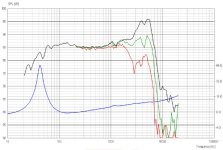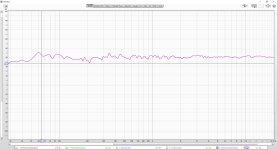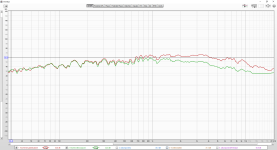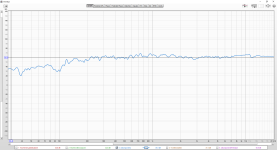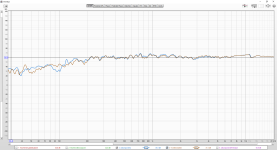Hello all,
I thought I was done with my three-way speaker crossover, but I was thrown for a loop. I am doing a Paradigm Studio 100v3 upgrade. I re-did the crossover and upgraded the woofers from the stock models to two Scanspeak Illuminator 18WU/8741T, where the factory frequency response (Fig 1) shows a reasonably flat response down to 75, maybe 50Hz. The woofers are wired in parallel.
After designing and testing my crossover, I ended up with the frequency response I was happy with (Fig 2). That bump between 50 and 110Hz, followed by the dip between 130 and 300 was always there, and I assumed it was some combination of cabinet resonance/room effects. After soldering the speaker together with 18 gauge solid core wire and installing the thick felt insulation that came with the speaker originally, I could tell that the bass was lacking. Testing (Fig 3), confirmed that the bass was not there, and when all three components were tested together (Fig4), I confirmed that the mid was doing the work down to about 200Hz (Fig 5).
I have tried about everything to troubleshoot this without taking the whole thing apart again, with consistent results. My only guess at this point is that the woofers aren't fully grounded. I soldered a 14 gauge solid core strand from the common ground point on the crossover to four 18 gauge strand that went to each speaker, and one 14 gauge strand that would go to the binding posts. Is there some way I can confirm/eliminate this suspicion with a multimeter?
This cabinet is well-braced, so taking out the crossover takes some contortion.
Any wiring suggestions or troubleshooting methods would be appreciated. Thanks
I thought I was done with my three-way speaker crossover, but I was thrown for a loop. I am doing a Paradigm Studio 100v3 upgrade. I re-did the crossover and upgraded the woofers from the stock models to two Scanspeak Illuminator 18WU/8741T, where the factory frequency response (Fig 1) shows a reasonably flat response down to 75, maybe 50Hz. The woofers are wired in parallel.
After designing and testing my crossover, I ended up with the frequency response I was happy with (Fig 2). That bump between 50 and 110Hz, followed by the dip between 130 and 300 was always there, and I assumed it was some combination of cabinet resonance/room effects. After soldering the speaker together with 18 gauge solid core wire and installing the thick felt insulation that came with the speaker originally, I could tell that the bass was lacking. Testing (Fig 3), confirmed that the bass was not there, and when all three components were tested together (Fig4), I confirmed that the mid was doing the work down to about 200Hz (Fig 5).
I have tried about everything to troubleshoot this without taking the whole thing apart again, with consistent results. My only guess at this point is that the woofers aren't fully grounded. I soldered a 14 gauge solid core strand from the common ground point on the crossover to four 18 gauge strand that went to each speaker, and one 14 gauge strand that would go to the binding posts. Is there some way I can confirm/eliminate this suspicion with a multimeter?
This cabinet is well-braced, so taking out the crossover takes some contortion.
Any wiring suggestions or troubleshooting methods would be appreciated. Thanks
Attachments
How did you do your measurements? Indoors, outside, outside on a pole?
Are your replacement woofers the same efficiency as the originals? I suspect that this is the problem, but hard to find efficiency of individual drivers in that speaker
Brian
Are your replacement woofers the same efficiency as the originals? I suspect that this is the problem, but hard to find efficiency of individual drivers in that speaker
Brian
I see 3 woofers, one midrange, one tweeter. How did you arrange the three woofers together?Paradigm Studio 100v3
Probably the three woofers were 16Ω and now 8Ω each..
And that's an electrical matter that might be resolved with the crossover, being the electro- mechanical factors the ones that determine the behavior of the transducer, and defined by the popular sigles Qt, Cms etc
Last edited:
Center of a room. The walls are poorly treated, but as long as the speaker/mic are consistently positioned (1m away, on axis with the mid), then I should get consistent changes, +- some room effects, right?How did you do your measurements? Indoors, outside, outside on a pole?
Are your replacement woofers the same efficiency as the originals? I suspect that this is the problem, but hard to find efficiency of individual drivers in that speaker
Brian
I did some woodworking and plugged the woofer hole closest to the mid, so tweeter and mid are adjacent, then ~6in of space in between drivers, then the two woofers and the stock port are all adjacent to each other.
Are the two woofers in series or parallel?
When you re-did the crossover, did you take the new impedance into account?
When you re-did the crossover, did you take the new impedance into account?
The woofers are in parallel.
Yes, I took the impedance into account. I have an amp that is more than capable, and have used the same amp throughout the entire process. I also used VituixCAD to double-check that my impedance values weren't getting impossibly low.
Yes, I took the impedance into account. I have an amp that is more than capable, and have used the same amp throughout the entire process. I also used VituixCAD to double-check that my impedance values weren't getting impossibly low.
The only other thing that I can think of is the fact that you measured it in the middle of the room. Low frequency wavelengths are long, so the room is likely to have an effect as you said in your first post. Have you tried putting them in the normal position for listening and tried measuring them there, with the microphone in the listening position?
The speaker efficiencies look right if the original manufacturer’s data is to be believed, so not sure what else it could be
Brian
The speaker efficiencies look right if the original manufacturer’s data is to be believed, so not sure what else it could be
Brian
Thank you all for your help. The cabinet resonances would be consistent when there is no insulating material and the same woofer causing that resonance. Once that resonance went away, it makes the relative inefficiency between the mid and the woofers apparent. I'll do some further experimenting.
The frequency response in the bass is not only reduced going from graph 2 to graph 3, but shows a completely different bass response. I must guess you are measuring is different room positions. The room will dominate the response in the low frequency especially at 1m distance.
Apart from all that otherwise might have gone wrong, why did you trade 3 (three) for 2 (two) woofers? The Paradigm units probably are just fine, I frankly am clueless about why one would throw anything short of $800 per side on a speaker that wasn’t exactly expensive to begin with. Rather buy some time and learn to measure properly 😉I see 3 woofers, one midrange, one tweeter. How did you arrange the three woofers together?
Probably the three woofers were 16Ω and now 8Ω each..
And that's an electrical matter that might be resolved with the crossover, being the electro- mechanical factors the ones that determine the behavior of the transducer, and defined by the popular sigles Qt, Cms etc
- Home
- Loudspeakers
- Multi-Way
- What happened to my bass?
